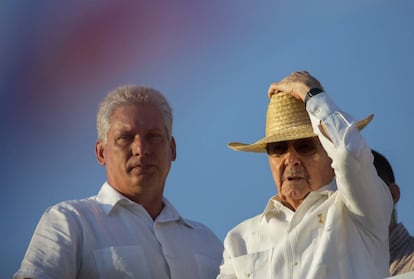The White House and a recession threatening Raúl Castro’s last year
The veteran leader will be stepping aside in 2018, but uncertainty reigns in the current climate

If the announcement made in 2013 when he began his sixth year in office is fulfilled, Raúl Castro, currently aged 85, will stand down as president of Cuba in February 2018, opening the way for a government not led by a Castro for the first time in six decades. This is Raúl’s opportunity to define his political legacy, without his brother Fidel, who died in November and whose presence was considered a brake on reform. Raúl Castro’s last year in office could be year zero of the transition to a new era on the island.

If 2015 was the year of the thaw with the United States, 2016 has been called the year of the counter-reform: following Barack Obama’s visit and invitation to open up the country, Fidel’s supporters reacted, and the cautiously flexible approach of Raúl’s pro-reformers receded.
“It is clear that the reforms have stagnated for the last two years. Raúl Castro has a year to get things going and improve the economy,” says Michael J. Bustamante, of Florida International University, who highlights two key factors: “The threat of Trump will set back bilateral relations,” and “the end of the escape valve that migration offered, without which there will be increased pressure in society for change,” he forecasts.
Cuba needs to grow by more than 5% if it is to develop
The economy is unlikely to take off in 2017, most experts argue. “The government is hoping for 2% growth because the Venezuelan economy is improving now that oil prices are rising. I think that is optimistic and Venezuela will continue to decline,” says Carmelo Mesa-Lago, an economist at the University of Pittsburgh, who estimates that trade with Caracas makes up 10% of Cuba’s GDP. Along with remittances from Cubans working abroad, tourism is the most dynamic sector. In 2016, four million visitors arrived, a record, and among them 270,000 people from the United States, thanks to Obama’s efforts to make it easier to acquire a tourist visa. Last year, regular direct flights from the United States to the island began after a hiatus of decades.
Now Donald Trump is threatening to demolish the bilateral policy of his predecessor, but former Cuban diplomat Carlos Alzugaray says that for the moment Trump has done nothing. “If he did, it would affect important companies,” he notes.
Cuban Economist Omar Everleny Pérez says that Cuba needs to grow by more than 5% if it is to develop, and to help do that it needs to liberalize its economy.
Alzugaray says reforms will be left to “a new generation of Cuban leaders.” Until 2021, Castro will remain secretary of the Communist Party, still the only legal party on the island. The presidency will be passed on to the current vice president, Miguel Díaz-Canel, aged 56, an apparatchik with a reputation for reform. Among the other faces that might lead renovation are Foreign Minister Bruno Rodríguez, former Economy Minister Marino Murillo, and Josefina Vidal, currently tasked with US affairs.
2016 has been called the year of the counter-reform
It is possible that Raúl Castro will speed up the promised law allowing for the existence of small businesses, along with a low-level reform of the electoral law, but that he won’t usher in a multi-party system.
Cuba’s economic transition cannot be halted, although its political reforms could take a lot longer. There are rumors that Alejandro Castro, aged 52, and his father’s right hand, will be brought into the highest echelons of power to serve as an envoy to Washington and a mediator between the interior ministry and the armed forces.
English version by Nick Lyne.
Tu suscripción se está usando en otro dispositivo
¿Quieres añadir otro usuario a tu suscripción?
Si continúas leyendo en este dispositivo, no se podrá leer en el otro.
FlechaTu suscripción se está usando en otro dispositivo y solo puedes acceder a EL PAÍS desde un dispositivo a la vez.
Si quieres compartir tu cuenta, cambia tu suscripción a la modalidad Premium, así podrás añadir otro usuario. Cada uno accederá con su propia cuenta de email, lo que os permitirá personalizar vuestra experiencia en EL PAÍS.
¿Tienes una suscripción de empresa? Accede aquí para contratar más cuentas.
En el caso de no saber quién está usando tu cuenta, te recomendamos cambiar tu contraseña aquí.
Si decides continuar compartiendo tu cuenta, este mensaje se mostrará en tu dispositivo y en el de la otra persona que está usando tu cuenta de forma indefinida, afectando a tu experiencia de lectura. Puedes consultar aquí los términos y condiciones de la suscripción digital.








































